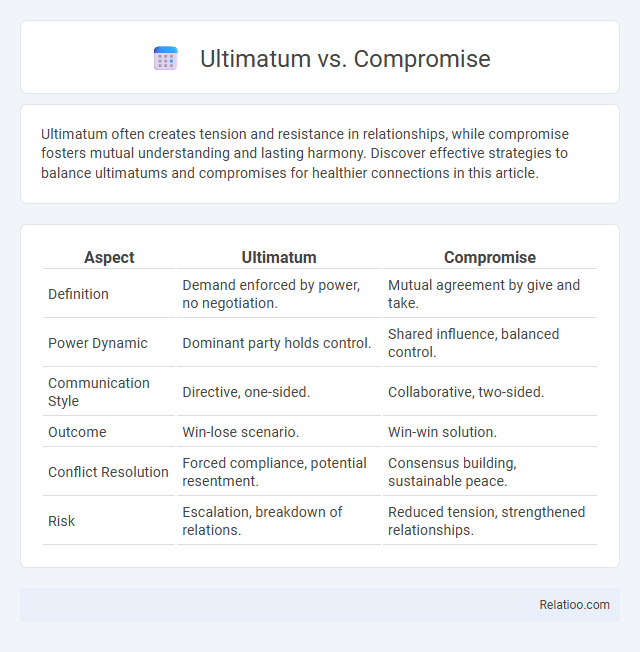Ultimatum often creates tension and resistance in relationships, while compromise fosters mutual understanding and lasting harmony. Discover effective strategies to balance ultimatums and compromises for healthier connections in this article.
Table of Comparison
| Aspect | Ultimatum | Compromise |
|---|---|---|
| Definition | Demand enforced by power, no negotiation. | Mutual agreement by give and take. |
| Power Dynamic | Dominant party holds control. | Shared influence, balanced control. |
| Communication Style | Directive, one-sided. | Collaborative, two-sided. |
| Outcome | Win-lose scenario. | Win-win solution. |
| Conflict Resolution | Forced compliance, potential resentment. | Consensus building, sustainable peace. |
| Risk | Escalation, breakdown of relations. | Reduced tension, strengthened relationships. |
Understanding the Concepts: Ultimatum vs Compromise
Ultimatum versus compromise centers on contrasting conflict resolution strategies where an ultimatum demands a non-negotiable decision, often imposing strict conditions, while compromise involves mutual concessions to reach a balanced agreement. Understanding ultimatum highlights its use as a rigid, one-sided demand enforcing authority or urgency, whereas compromise reflects flexibility, collaboration, and prioritization of shared interests. Effective conflict management requires recognizing when ultimatum pressures are necessary versus when compromise fosters sustainable, cooperative outcomes.
The Psychology Behind Ultimatums
The psychology behind ultimatums reveals a power dynamic where one party exerts control to force a decision, contrasting with compromise, which involves mutual concession to achieve a balanced outcome. Ultimatums often trigger psychological resistance or compliance based on perceived threat and individual assertiveness, potentially damaging trust and communication in Your relationships. Understanding these underlying mental mechanisms can help you navigate conflicts more effectively by recognizing when ultimatums signal deeper emotional or strategic issues.
The Art of Reaching a Compromise
Mastering the art of reaching a compromise involves understanding the nuances between ultimatums and genuine compromise. An ultimatum demands a specific outcome, often creating a win-lose scenario, whereas compromise seeks a mutually acceptable middle ground where both parties benefit. Your ability to navigate these dynamics enhances communication and fosters lasting agreements in both personal and professional relationships.
When to Use an Ultimatum
An ultimatum is most effective when you need to set a clear boundary and require immediate compliance or decision from the other party, often in high-stakes or time-sensitive situations. Unlike compromise, which involves mutual concessions, ultimatums are non-negotiable and signal your firm stance on critical issues affecting your interests or values. You should use an ultimatum only when the consequences of inaction are severe and you are prepared to follow through on the stated demands.
The Benefits of Compromise in Conflict Resolution
Compromise in conflict resolution fosters mutual understanding by encouraging both parties to make concessions, leading to quicker and more sustainable agreements. This approach reduces hostility and promotes collaboration, improving relationships and trust between conflicting sides. Studies show that compromise increases the likelihood of long-term satisfaction by balancing interests rather than imposing a winner-takes-all outcome.
Key Differences Between Ultimatum and Compromise
An ultimatum presents a final demand or statement of terms, often leaving no room for negotiation, while a compromise involves mutual concessions to reach a shared agreement. The key difference lies in flexibility: ultimatums are rigid and force a decision, whereas compromises require cooperation and willingness to adjust. Understanding these distinctions helps you navigate conflicts effectively by choosing the appropriate approach for resolution.
Risks Associated with Issuing Ultimatums
Issuing ultimatums can damage trust and escalate conflicts, as they often force decisions under pressure rather than fostering collaboration. Unlike compromise, which promotes mutual agreement and flexibility, ultimatums create a win-lose scenario that risks alienating parties and hindering long-term relationships. Your ability to negotiate effectively diminishes when relying on ultimatums, increasing the likelihood of breakdowns in communication and unresolved disputes.
Strategies for Effective Compromise
Effective compromise strategies emphasize clear communication, active listening, and mutual respect to balance diverse interests and achieve collaborative solutions in conflict resolution. Establishing shared goals and flexibility in negotiation fosters trust, reducing the adversarial nature often seen in ultimatums. Prioritizing win-win outcomes over rigid demands enhances relationship sustainability and long-term cooperation across personal and professional contexts.
Real-World Examples: Ultimatum and Compromise in Action
In international diplomacy, the Cuban Missile Crisis exemplifies an ultimatum where the U.S. demanded the removal of Soviet missiles under threat, contrasted by the successful compromise in the Iran Nuclear Deal, which balanced sanctions relief for nuclear limitations. Business conflicts often mirror these approaches, with companies issuing ultimatums during negotiations for mergers, while compromise is evident in collective bargaining agreements that adjust terms for mutual benefit. These real-world examples highlight how ultimatums enforce strict demands, whereas compromise fosters collaboration and long-term resolution.
Choosing the Right Approach: Ultimatum or Compromise?
Choosing between an ultimatum and compromise hinges on the desired outcome and relationship dynamics; ultimatums offer clear, non-negotiable demands often used in high-stakes scenarios, while compromise seeks mutual agreement by balancing conflicting interests. Effective decision-making requires assessing the urgency, power balance, and long-term impact of either approach on collaboration and trust. Strategic use of ultimatums can enforce boundaries decisively, whereas compromise fosters cooperation and sustainable solutions in negotiations or disputes.

Infographic: Ultimatum vs Compromise
 relatioo.com
relatioo.com